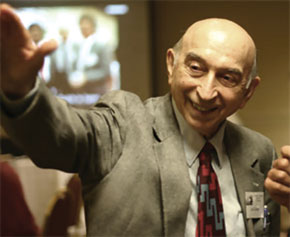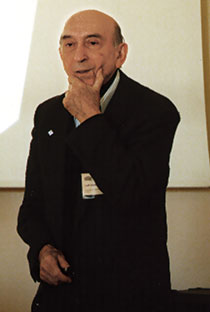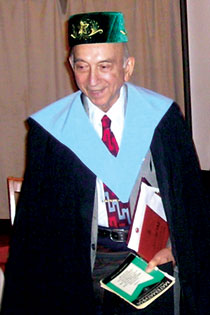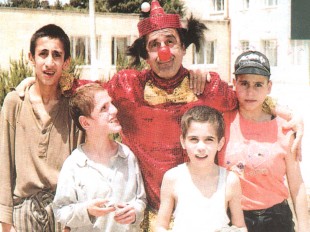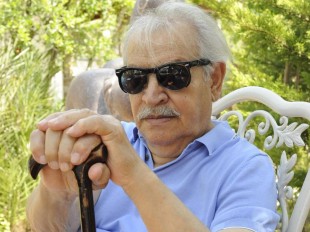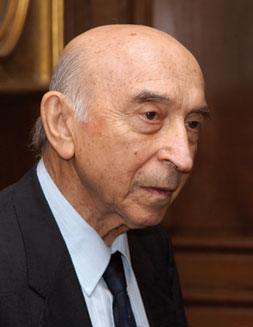 Pages 66-70
Pages 66-70by Mahbaddin Samad
Interview with Professor Lotfi Zadeh
The eminent scientist Professor Lotfi Zadeh will turn 90 on 4 February 2011. Lotfi Rahim oglu Alasgarzadeh (Lotfi Zadeh) was born in Baku and began his elementary education at School No 16. In the early 1930s, his family moved to Tehran and he continued his education first at an English-speaking high school and then at Tehran University. He graduated in 1942 and moved to the USA in 1944. In 1949, he received his MSc degree from Columbia University (New York), while in 1959 he started working at the University of California, Berkeley, where he developed the theory of fuzzy logic.
Mohbaddin Samad interviewed Lotfi Zadeh, one of the world’s most authoritative scientists, for our magazine.
M.S. The extensive application of your scientific theory in Japan, South Korea, Singapore and a number of other countries has worked wonders. Strangely enough, many still view you as a rather unusual person. What are you like, Professor Lotfi Zadeh?
L.Z. I am one of the millions of people living on earth. In fact, I came to America not from a distant civilization but from an Eastern country. To be more exact, my historical homeland is Baku, the capital of Azerbaijan. I spent my childhood in Baku’s Asia Street (called Montin in Soviet times and now A. Guliyev Street). My father Rahim Alasgarzadeh was a highly educated man. First he was a writer for Iranian newspapers in Baku, but then he linked his future to foreign trade. My mother was a psychologist. She was always so busy that I had to do all the work myself. I liked drawing a lot. Unlike my peers, I was an introvert. I wasn’t very much into cigarettes or girls. Instead, I was very focused on my education and scientific research. I constantly read books. I was thinking of developing machines resembling humans. As I read Jules Verne’s science fiction stories, I believed that my wishes would one day come true.
M.S. You spent your childhood in both Baku and Tehran. In other words, you had your first learning experiences in these two cities. How do you recall those days from the perspective of the present-day?
L.Z. When my family lived in Baku, I completed the first three years of my education. In the early 1930s, after we had moved to Iran, my parents sent me to the English-language Alborz High School which was attached to a local church. There was a huge difference between this school and Soviet-type schools. After studying there for a while, I was transferred to a college. I was required to complete six years at college. Therefore, I received my education in a completely different environment. Lessons were conducted in Farsi and several courses were taught in English. It was a great college because it was there that I learned about American people and culture for the first time. Then I was admitted to Tehran University and graduated with a bachelor’s degree. Religion was not so prominent in Iran at the time. Only one person at Tehran University, Professor Bazargan who subsequently became prime minister, was truly pious.
M.S. Professor, there must be a good reason for a well-educated person to emigrate to another country. What urged you to move to America?
L.Z. Indeed, there were objective reasons behind my emigration to America. Most importantly, Iran wasn’t a country that could address my scientific interests at the time. That is why I left for the USA in 1944.
M.S. Immigrants do not always enjoy the red-carpet treatment. In fact, having to start everything from scratch, many of them face difficulties. You must have encountered some problems in America too.
L.Z. You know, those who have never been to America or met its people always have high hopes. I was no exception. When I actually found myself here, I quickly realized that I literally had to fight for survival. Since I understood this from my early days here, I managed to be rational. I did my best to be admitted to the Massachusetts Institute of Technology. Then I had a job at an electricity company in New York. In September 1944, I went to Boston. In 1947, my parents came to America and settled down in New York. I was an engineer at Columbia University at the time. I was also working as a teacher and studying. I tried to be near my parents to be of help. In 1948, I received a PhD degree in electrical engineering from Columbia University. A little later, in 1957, I was promoted to Full Professor. In 1959, I came to the University of California in Berkeley. At first I had a difficult period in my new job, but eventually I was happy to have come to California because the University has very good scientists and great conditions for research.
M.S. I notice that you have a phenomenal memory. It would be interesting to hear your recollections about the Baku period of your life.
L.Z. I was 10 when we left Baku. In summer, we would go to Kislovodsk or Mineralnye Vody for a holiday. I even visited Moscow once. I remember the Baku Boulevard very well. When I visited Baku in 1965, I felt that people had changed a lot. The flat we had lived in was occupied by relatives. I was very happy to experience these pleasant feelings again. I also recall the Buzovna beach. In other words, I still have very warm recollections of Baku.
It also stands out in my memory that before we left for Iran the economic situation in Baku was beginning to deteriorate. I still remember the long queues for bread.
M.S. Do you remember the school you went to in Baku?
L.Z. I don’t remember the exact name of the school, but it was a Russian-language school. Azerbaijani wasn’t spoken much. Another thing I remember from Soviet school is that we were raised in a spirit of self-sacrifice for the state....
M.S. The 20th century was known as one of scientific breakthroughs. Now it is said that we are at the junction of two revolutions. Are these simply words or present-day reality?
L.Z. Yes, we are at the junction of two revolutions. The first is the information revolution which has produced the Internet. The second is the revolution of intellectual systems, which has given birth to robots, intellectual management and fuzzy systems....
M.S. The Internet seems to have become an important part of our life. People see it differently – some are pleased with it, others are not. Experts suggest that the Internet has not fully realized its potential yet... What is the future of the Internet like in your view?
L.Z. The Internet is developing very fast. The global network can already be accessed from mobile phones and small computers. In my time, computers were as big as whole rooms, then we had notebooks, now we can go online from a mobile phone. One of the most important segments of the Internet is search. Google does that brilliantly. In the future, the search function will be significantly enhanced to bring answers to questions. This is one of the most important directions of the IT sector....
M.S. You left Baku in the 1930s. Since then, you have only been back twice: in 1965 and on a two-day visit in 2008 to attend the BakuTel International Exhibition and Conference. You suggested then that a regional scientific research centre be established in Azerbaijan. What specifically can be done to that end?
L.Z. I am sure there is everything necessary in Baku to turn it into a centre of science. I do hope that the conference will contribute to that. The establishment of research centres would be extremely useful. For instance, the opening of an IT centre that would attract specialists from Azerbaijan and beyond would be highly commendable....
M.S. Oil or a human being. What is more important?
L.Z. Humans are the world’s greatest asset. I have always been in favour of the black gold translating into human prosperity. And I still am.
M.S. When did you last have a vacation?
L.Z. I have not been on leave since I came to Berkeley, California, in 1959. The best vacation for me is participation in an international science conference. My wife and I attended a conference in Nevada and that was the best vacation ever....
M.S. No other scientist has ever developed 15 theories. When was your first scientific discovery?
L.Z. As I said earlier, I thought of designing man-like machines back in my childhood. I have always been interested in that. In 1961, I wrote an article suggesting that we need fuzzy mathematics. I had no idea at the time how to accomplish it. In 1963, I started to understand the subject slightly better, while in 1964 I completed my first research which was published in 1965.
M.S. When you published it, did you rejoice at this being a discovery of global scale?
L.Z. I knew that this research would be useful, but it proved even more useful than I had expected....
M.S. Why wasn’t your theory accepted in America?
L.Z. It is not a very straightforward issue. In comparison with the classic theory, fuzzy sets are rectangular. This is why many are not interested in them. But there are scientists who have stood by my ideas. In addition, the word “fuzzy” has another meaning in English, which is why it is not used in many research works.
When I was writing my first research, I was a department manager at Berkeley University and had a lot of work. Even there the research was not universally welcomed. Some criticized it. That, however, did not discourage me at all. I knew only too well that scientific innovations are never accepted immediately and have to pave their way to recognition through practical application.
M.S. Do you know why your theory was neglected in America and Europe, while Middle Eastern and Asian countries started applying it almost immediately?
L.Z. This has to do with the intellectual level of people in these countries. As you may know, Americans and Europeans tend to think in accordance with exact patterns, while Oriental nations have a more flexible approach to thinking. This is perhaps why the theory was first applied in the East and only then in Europe.
M.S. How did it happen that the theory introduced with so much difficulty won Japan’s highest Hondo and Okawa awards?
L.Z. Japan, a rather conservative country, is interested in the economic benefits of any scientific invention. After Japanese scientists and industrialists had studied my theory, they realized that it would produce economic benefits. Thus, the fuzzy sets and fuzzy logic systems caught on in Japan. The Japanese made unbelievable profits using my theory. This is how I was nominated for the award....
M.S. You created a revolution in science.... Can you tell us what features of your personality have helped you do this massive work?
L.Z. I will be candid with you. My Turkic thoroughness and Turkic determination have helped me a lot in conducting and implementing my research....
M.S. What human qualities do you appreciate the most?
L.Z. I like benevolent and honest people. I have reliable and noble friends. There are people who want to be your friend for a purpose. From this standpoint, it is impossible to compare Oriental nations and Americans. In America I have never seen true friendship, something I had in Baku. I have friends in Baku who always want to see or help you. There is no such thing in America. There are several kinds of friendship in America. Relations are usually shaped by circumstances....
M.S. The world has faced global problems at all times. People have found different solutions to them – some looked for a solution in literature, others in science. What do you think about this as a prominent scientist?
L.Z. It would be ludicrous to think that literature can resolve global problems. A source of aesthetic enjoyment, literature has never resolved any of mankind’s global problems and it is unlikely that it ever will.... Global problems have always been resolved with the aid of science, and this will always be the case. As a matter of fact, let me recall that the 21st century is the age of intellectual systems. During this period, the world will be run by robots, intellectual management and fuzzy systems.
M.S. You left Azerbaijan in the 1930s. Since then, you have only been to Baku twice – in 1965 and 2008.... Despite this, after the broadcast of a documentary series called “Lotfi Zadeh Far and Near”, there is enormous respect for you in your home country. People want to see you very much. Do you have plans to visit Azerbaijan again?
L.Z. I love Azerbaijan from the bottom of my heart. This love is in my blood and genes. Although we don’t see each other very often, people still remember me. I am very proud to enjoy so much love and respect from my native people. As to visiting my historical homeland in the future, to be honest it seems a little too difficult at this point in time. There are many circumstances beyond my control that prevent me from doing that.
M.S. What were your impressions of Baku after your brief visit in 2008?
L.Z. Frankly speaking, Baku has developed a lot. I can even say that nowadays it can compete successfully with the most beautiful cities of the world.
M.S. It would be interesting to know what dreams you have at such a venerable age.
L.Z. I have never had unrealistic dreams. But there is one question that you didn’t ask of me. Imagine that you are a magician and offer to take me back to the time when I was 20 years old. I am not sure whether I would agree to that. If that were the case, I would have to go through an education again and then look for a job. I don’t know what the future holds for me either, but still I would prefer to stay where I am now and not have to struggle for anything else.…
About the author: Mohbaddin Samad is a writer, publicist and scriptwriter of the “Lotfi Zadeh Far and Near” documentary series (released in Azerbaijani and English in 1998). He is also the author of a popular scientific book: “The World can’t Live without Great People” about Lotfi Zadeh’s life and scientific work. The book was published in Baku (2000), Istanbul (2005) and Stockholm (2008).
